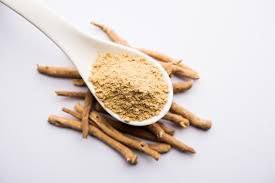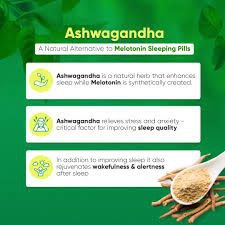How Ashwagandha Helps You Sleep Better: The Science Explained
Insufficient sleep could impair your cognitive function and weaken your immune system. Additionally, it increases the risk of hypertension, diabetes, obesity, depression, heart attack, and stroke(The Effects of Sleep Deprivation, n.d.).

I love getting up refreshed and energized, but quality sleep has become a luxury in today’s fast-paced world. Workload stress and lifestyle changes decreased my sleeping ability. While Medications could help, they often come with annoying side effects and complications.
Ashwagandha is an ancient adaptogenic herb that shows promising results in sleep quality. It also has additional benefits, such as reducing stress and anxiety and improving mood, cognitive function, and overall well-being.
However, does Ashwagandha help with sleep? This blog will explore the science behind its benefits, how it works, and whether it could be a natural solution for improving sleep quality.
What is Ashwagandha?

Ashwagandha (Withania somnifera (L.) Dunal) is a natural plant in Asia, Africa, and Europe. Indigenous people have used it for over 3,000 years, and its name, “somnifera,” is derived from its sleep-inducing properties.
Ashwagandha’s roots and leaves are essential components of the traditional Ayurvedic system. Ayurveda describes its effects as calming the nervous system and reducing stress hormones, which support relaxation.
It helps reduce personal stress, increase energy levels, enhance cognitive function, and improve sleep quality(National Institutes of Health, n.d.).
How does it work in the Body?
Reduces cortisol (stress hormone):
It’s difficult to fall asleep when you are under stress. Many parts of your body regulate cortisol, the primary stress hormone. Your immune system, autonomic nervous system, and several brain regions all play a role in maintaining its balance. The good news is that Ashwagandha does not just target one specific system—it helps regulate cortisol levels across multiple pathways. Research suggests that Ashwagandha may reduce sensitivity to stressors, supporting its classification as an adaptogen (Mikulska et al., 2023).
Supports GABA activity:
I used Ashwagandha, which I love due to its sedation and relaxation effects. I searched to understand how it works and found that it enhances a neurotransmitter called GABA that promotes relaxation in the brain. I also found that it improves the quality of life for people struggling with insomnia and anxiety by regulating cortisol(Deshpande et al., 2020).
Helps in sleep by regulating Serotonin and melatonin:
Let’s first understand the role of these hormones in the sleep-wake cycle:
Serotonin is a neurotransmitter concerned with wakefulness and enhances mood with many other functions. When night comes, the body converts Serotonin into melatonin, the hormone that prepares the body for sleep.
Research suggests that Ashwagandha enhances serotonin activity, thus reducing stress and anxiety and improving well-being(MedlinePlus., 2024).
By reducing stress and cortisol, Ashwagandha creates a more stable environment for Serotonin to function correctly.
On the other hand, Ashwagandha’s effect on melatonin is indirect; it maintains serotonin balance and thus enhances melatonin formation, resulting in a regulated sleep cycle.
To summarize, Ashwagandha helps promote restful sleep by reducing stress, enhancing Serotonin, and supporting melatonin production.
Journal of Herbal Medicine in 2021 analyzed 14 research, with 491 participants from India who were diagnosed with high stress or anxiety disorder.
Some of them used Ashwagandha, and others took a placebo, an inert substance that doesn’t have any effect. After 8 weeks, most participants who took Ashwagandha reported better sleep and less fatigue, stress, and anxiety(Lopresti et al., 2021).
Can Ashwagandha Help You Sleep Better? Here is What Science Says:

We talked about how Ashwagandha decreases cortisol, regulates sleep hormones, and enhances the quality of life. But how does it help you sleep better?
A 2021 research summary of multiple research To determine the effect of Ashwagandha extract on sleep(Choudhary et al., 2021). The result of the study shows the following:
1. Reduces Nighttime Stress & Anxiety:
Ashwagandha is excellent for lowering cortisol levels and boosting GABA, which can help you feel calm and ready for a good night’s sleep!
2. Enhances Sleep Onset & Reduces Wake-Ups:
Triethylene Glycol (TEG), found in Ashwagandha, has some exciting new research behind it! TEG can positively impact sleep by helping you fall asleep faster.
3. Improves Sleep Duration & Deep Sleep Stages:
TEG also promotes deeper sleep. Thus, you might wake up less often and have a deeper sleep, leading to a more restful night’s sleep. How great is that?
4. Regulates Circadian Rhythm for Consistent Sleep Patterns:
The research suggests that Ashwagandha may help align one’s natural sleep rhythm by promoting restful sleep and reducing nighttime wakefulness, making it easier to wake up refreshed and energized.
A clinical trial tested Ashwagandha root extract on 80 participants—half with insomnia and half healthy—over 8 weeks. Those taking Ashwagandha showed significant sleep improvements, including falling asleep faster, longer sleep duration, better sleep efficiency, and improved morning alertness. The benefits were more remarkable for insomnia patients.
The study confirms Ashwagandha can enhance sleep quality and help manage insomnia, with all participants tolerating it well. More research is needed, but these findings highlight its potential as a natural sleep aid.
How Does Ashwagandha Compare to Other Sleep Aids?
Two main approaches to treating sleep problems are pharmacological (medications) and non-pharmacological (lifestyle and natural therapies).
1. Common Sleep Medications: Effective But Risky
Drugs like: zolpidem, diazepam,Sedating antidepressants, Antihistamines, and Melatonin receptor agonists.
Downsides of Sleep Medications:
- Risk of dependency & withdrawal.
- Side effects include drowsiness, memory issues, and dizziness.
- It can disrupt the natural sleep cycle.
2. Non-Pharmacological Sleep Treatments: Safer But Limited Access:
Alternative therapies:
Includes massage, music therapy, acupuncture, aromatherapy, and herbal medicine (where Ashwagandha fits in!).
Ashwagandha is promising as a natural sleep aid, yet more research is needed to understand the exact mechanism fully. However, what is knowing for know are:
- Used in Ayurveda by many countries for centuries.
- It contains withanolides & trimethylene glycol (TEG), which may support sleep.
- It helps reduce stress & anxiety, which are significant causes of insomnia.
- Generally well tolerated & safe, even at high doses (6–10g).
If you’re looking for immediate results, medications may be effective. Still, they come with risks, such as dependency and side effects. Alternatively, Ashwagandha is a safe, natural option to help with stress-related sleep issues. However, research is ongoing, and it may take several weeks to notice any benefits.
How to Use Ashwagandha for Sleep:
First, create a sticky schedule for sleep and wake-up times to get better results. This will prepare you for sleep and program your body for specific sleep and wake-up times.
Second, stop using any screen light source before one hour of sleep. Third, avoid heavy meals, and if you drink coffee, make the last cup around midday and no longer after.
There is no specific dosage formula for Ashwagandha till now. Still, you should follow up with your doctor and avoid taking other medications that may interact with it.
Information about using Ashwagandha is limited, but researchers show that a dosage of 500 or 600 mg daily for eight weeks provides more benefit. Yet the safety of Ashwagandha in the long term is unknown(Sleep Foundation, n.d.).
Ashwagandha is available in various forms, including:
- powder
- capsules or tablets
- liquid extract
- tea (often combined with other calming herbs)
You can select from various formats based on your preferences. However, liquid forms are generally more effective for quick results, while tablets can manage and maintain consistent dosing.
It’s important to note that most studies emphasize the sleep benefits of Ashwagandha over an extended period, typically lasting several weeks. Some individuals may experience a boost in energy soon after consuming the herb, which could disrupt sleep if taken right before bedtime(Sleep Foundation, n.d.).
How Long Does It Take to Work?
You may experience two short-term and long-term effects; your nervous system will immediately calm down, and you will be more grounded and relaxed.
Your sleep cycle will return to normal for long-term effects, and your stress level will decrease with improved well-being.
Remember, effects vary from person to person, but consistency is key for better results. For instance, a study of 150 adults with insomnia who used Ashwagandha for 6 weeks showed improved sleep quality after daily supplementation (Office of Dietary Supplements—Ashwagandha, n.d.).
Therefore, it’s generally recommended that at least 6 to 8 weeks of regular use be allowed to assess the herb’s effectiveness.
Possible Side Effects & Precautions
Common Side Effects:
- Nausea (feeling like you’re going to throw up)
- Headache
- Drowsiness (especially with high doses)
- Stomach irritation
- Diarrhea (loose or watery stool)
Who Should Avoid Ashwagandha?
- Pregnant & breastfeeding women.
- People on thyroid or blood pressure medications.
- Those with autoimmune disorders (consult a doctor).

Ashwagandha, a natural adaptogen, has significantly improved the mood, cognition, and well-being of people suffering from sleep problems. It also enhances sleep quality and duration and regulates their sleep cycle.
There is no evidence of severe complications or addiction, unlike sleep medications. It’s well-tolerated but has side effects, so following up with your doctor is better.
Do you want to sleep like a newborn and be less stressed? Try ashwagandha and experience the benefits firsthand.
